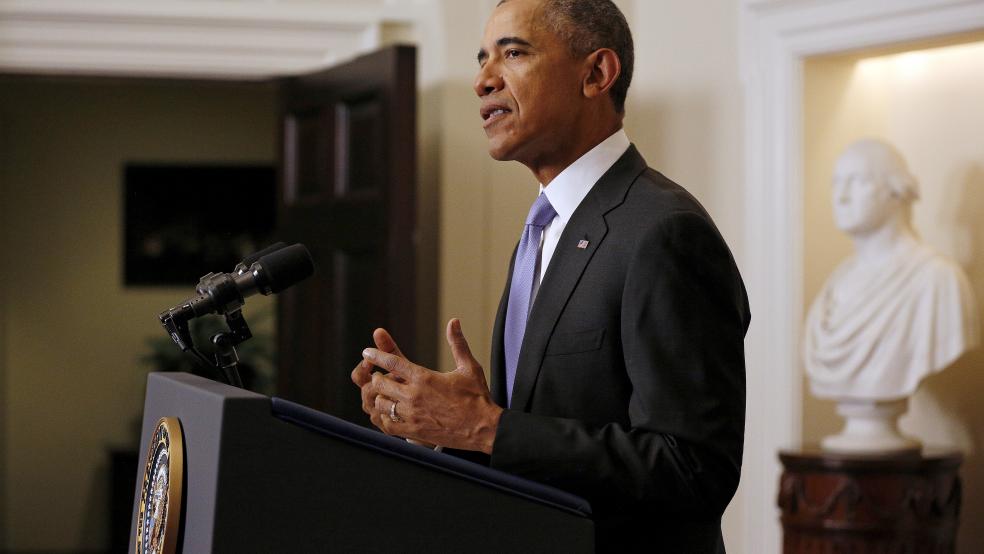President Obama’s September agenda will need a glass case all its own when his presidential library is built. Straight from Chinese President Xi Jinping’s state visit, Obama is now scheduled to meet Vladimir Putin at the U.N. Monday. Count Pope Francis and our 44th chief executive will have convened with three of the world’s most powerful people in the course of a couple of weeks.
The encounter with Putin and the “fruitful and constructive summit” with Xi , as Xinhua News Agency called it, look altogether weird. Obama is suddenly talking about mutual interests and cooperation with leaders of the two nations with which Washington is most directly in competition. What’s going on here?
Related: In First U.S. Visit, Xi Arrives Dragging a Diminished Economy
Intentionally or otherwise—and it’s hard to tell intent from accident with this president—Obama is delivering a message. Like it or not, and plenty of us don’t, we’ve entered an era of interdependence that looks very like our 21st century destiny.
Whether or not you went along with Bush’s stance in foreign policy, it had the virtue of clarity. Obama’s doesn’t.
To put the point another way, the unilateralism that defined policy during the administration of George W. Bush is only a few years behind us, but think for a minute how distant it already seems.
Whether or not you went along with Bush’s stance in foreign policy, it had the virtue of clarity. Obama’s doesn’t: It’s all over the place, a sea of confusion. The question is how to read all the false starts, reversals, half steps, and advances quickly followed by retreats.
Putting the conclusion first, the current state of U.S. foreign policy is symptomatic not so much of a bumbling president as a nation whose place in the world has entered a period of profound transition. Obama’s a novice on the foreign side—Democratic presidents often are—but it’s questionable whether a chief executive of any other stripe or conviction would have compiled a more coherent record.
Related: The Pope Was a Breeze for Obama…President Xi Is Another Story
I see a pattern in this administration’s relations with Beijing and Moscow, beginning with Obama’s inheritance. He assumed adversarial positions vis-à-vis China and Russia when he took office in 2009, and tensions heightened in both cases. Six years later, it looks as if we’re watching a fundamental turn.
Good. It’s exactly what’s needed.
Washington’s China policy has been shaped for years by the assumption that this is “the Pacific Century.” The idea is that China will achieve primacy in East Asia—eclipsing America’s post-1945 dominance and turning longtime allies such as Japan and South Korea into modern variants of the Middle Kingdom’s tributary states.
China’s rise as a Pacific power, therefore, must be resisted. It’s a zero-sum game in this line of thinking: Beijing’s gain is Washington’s loss. If you study this even briefly, it’s little more than a reiteration of Cold War rhetoric in the Asian context.
The Pacific Century is a Pacific myth, as two seasoned Asia hands, James Clad and Robert Manning, have insisted for years. China’s emergence—as a global power, indeed—is inevitable, but it simply doesn’t follow that confrontation rather than cooperation and partnership is the logical course.
Related: Obama Announces ‘Understanding with Xi on Cyber Theft
In my read, Obama reached the end of his rope when Treasury, State, and National Security Adviser Susan Rice more or less railroaded him into that ridiculous effort to undermine the Beijing-sponsored Asian Infrastructure Investment Bank when it was launched last March. If I’m correct, Xi’s state visit represents a turn away from the orthodoxy for the simple reason it just proved so embarrassingly wrong.
Xi’s message was plain even before he reached Washington. By stopping in Seattle to consult with American executives and announce a $38 billion order for 300 planes from Boeing, the Chinese leader said in effect, “Look, the world’s two largest economies are interdependent. Let’s stay steady and explore the common ground.”
Fair enough, the agreements on carbon emissions and cybercrime that emerged in Washington may be hard to enforce. But does this mean they’re somehow not worth pursuing? As recently as last week, the expectation was for a “clash” on the cyberattack question.
We’ve been told little as to what Obama and Xi said about maritime security in the South China Sea. But I’ll eat my hat if the topic didn’t come up. I take the public silence on this question to reflect a mutual determination to reach an accommodation without embarrassing either side. Net-positive.
Related: Now We Know What Putin Is Up to In Syria
As to the scheduled session with Putin at the U.N., it simply reinforces the contacts Secretary of State Kerry has cultivated in recent weeks with Sergei Lavrov, his Russian counterpart. As a much-noted opinion piece in The New York Times asserted last week, “There can be no peace in Syria without Russia.”
This column argued last week accepting Russia’s role in Syria would prove open-ended. And then Kerry began a week of diplomacy at the U.N. Saturday by signaling that Iran, too, will be part of a multi-sided solution. “I view this week as a major opportunity for any number of countries to play an important role,” Kerry said in New York.
This leaves Pope Francis. I don’t see his visit to Washington last week as simply a pause for momentary moralizing. He has no desire to be that kind of pontiff, plainly.
What was he in his meeting with Obama and his plea for world unity in his speech to Congress if not the Greek chorus behind these major players? The message was simple: We need to think thoughts we’ve yet to think and do things we’ve left undone.
This can’t be stored away as Christian idealism any longer: Considering the state of the world it’s realism in its purest form. Francis will approve, surely, of Obama’s new demarches to its two most prominent antagonists.






